Assessing the Health, Social, and Economic Wellbeing of Gulf Coastal Communities
The Health subteam began its work by conducting a systematic review of published health effects of oil spills and created a dynamic, searchable database of relevant literature. The database provides a clearinghouse for practitioners and researchers searching for relevant papers and reports on oil spill-health impacts. Of the 75 papers reviewed, 38 were published during or after 2010 and related to the DWH oil spill. To learn more, view CRGC’s Overview of the Health Literature Search and Database. To download the searchable database, please visit CRGC’s Resources Page.What Were Our Findings?

Photo by Petty Officer 3rd Class Patrick Kelley/FlickrA worker cleans up oily waste on Elmer’s Island, just west of Grand Isle, Louisiana
- Medium and Long-Term Effects Need Analysis: Research teams, collecting data less than a year after the DWH oil spill, published in 21 papers. Many of these studies find initial health and social well-being issues emerging after the oil spill, but continued efforts are needed to determine the medium and long-term effects.
- Multi-Organizational and Interdisciplinary Approaches are Valued: Many papers indicate that they are part of larger research efforts, which include multiple research institutions and disciplinary perspectives.
- Vulnerable Populations are Diverse: Researchers have focused on vulnerable populations, including the Vietnamese fishing population, residents seeking mental health treatment, renewable resource communities, women, and children.
- Knowledge Gaps Still Remain: Since the 2010 DWH oil spill, researchers have addressed recommendations in diverse ways, but some gaps still remain. We identified opportunities for research to inform the development of the Survey of Trauma, Resilience, and Opportunity of Neighborhoods in the Gulf (STRONG).
What is the Current Mental Health and Social Wellbeing of Gulf Coastal Residents?
We administered the STRONG questionnaire to 2,520 respondents via a random digit dial landline and cell phone survey (April-August, 2016) in the 56 coastal counties and parishes in Texas, Louisiana, Mississippi, Alabama, and Florida. The questionnaire included measures of:-
- Health: Physical, Mental, and Behavioral Health; Trauma History; Healthcare Utilization
- Exposure to the DWH Oil Spill: Clean-Up Activities; Damaged Property; Damaged Commercial Fisheries; Impact to Recreational Activities and/or Diet; Employment in Affected Industries
- Networked Adaptive Capacities: Social Capital; Community Competence; Information and Communication; Economic Development
Does Wellbeing Vary with Reported Exposure or Impact by County/Parish?
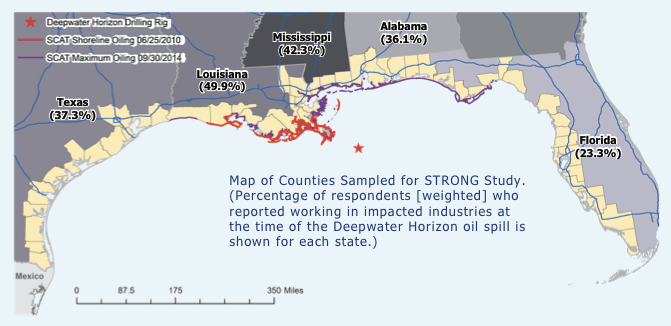
What are our Next Steps?
Data have been cleaned, post-stratification weights have been created to ensure results are representative of the region, and variables with missing values have been imputed. Analyses are currently underway for multiple peer-reviewed papers on:- Predictors of mental and behavioral health outcomes, with state-specific estimates.
- Worry about ongoing impacts as a function of recalled exposure and past victimization.
- Communication source preferences and trust in media.
- Impacts of the composition and structure of social networks on resilience.
Related News
Fellows Participate in 2nd Module of “Planning For Resilient Gulf Communities” Executive Leadership Training
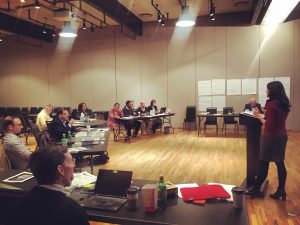 Inaugural cohort of Southeastern Louisiana Disaster Resilience Leadership Fellows participate in second module of “Planning for Resilient Communities” Executive Leadership Training.
Inaugural cohort of Southeastern Louisiana Disaster Resilience Leadership Fellows participate in second module of “Planning for Resilient Communities” Executive Leadership Training.
CRGC Students Showcase Poster Presentation on Utilizing Lay Health Workers Post-Disaster
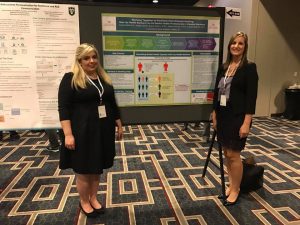 Alyssa Wood and Keagan Smith, from the University of South Alabama showcase their poster presentation at the 2017 Gulf of Mexico Oil Spill & Ecosystem Science Conference, which took place February 6-9 in New Orleans, LA.
Alyssa Wood and Keagan Smith, from the University of South Alabama showcase their poster presentation at the 2017 Gulf of Mexico Oil Spill & Ecosystem Science Conference, which took place February 6-9 in New Orleans, LA.
CRGC Researchers Discuss Human Dimensions and Activity of Oil Spill Response at 2017 Gulf of Mexico Oil Spill & Ecosystem Science Conference
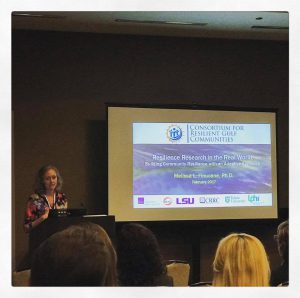 Eight CRGC researchers present during day-long session surrounding human dimensions of the DWH oil spill and interdisciplinary communications and community resilience from a social ecological and systems approach at the 2017 Gulf of Mexico Oil Spill & Ecosystem Science Conference.
Eight CRGC researchers present during day-long session surrounding human dimensions of the DWH oil spill and interdisciplinary communications and community resilience from a social ecological and systems approach at the 2017 Gulf of Mexico Oil Spill & Ecosystem Science Conference.
The Deepwater Horizon Oil Spill’s Impact on Mental Health: Increases in Stress and Anxiety
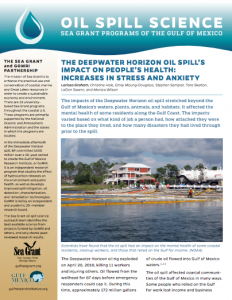 The Sea Grant Oil Spill Science Outreach Team released a new publication, highlighting how the 2010 oil spill affected mental health in both individuals and coastal communities.
The Sea Grant Oil Spill Science Outreach Team released a new publication, highlighting how the 2010 oil spill affected mental health in both individuals and coastal communities.
Shipbuilders in AL and LA Expand Operations to Deliver New Fleet of Passenger Ferries for New York City
 Horizon Shipbuilders, based out of Bayou La Batre, AL, and Metal Shark, a boatbuilder located in Franklin, LA, are rapidly working to build boats for an ambitious citywide ferry service that New York City Mayor Bill de Blasio has pledged to begin next summer. Horizon and Metal Shark are working on a tight schedule to build the 19 vessels needed for Mayor de Blasio’s $325-million citywide ferry service, timed to begin as he seeks re-election for office next November. This new ferry service would be the most extensive of its kind in any American city.
Horizon Shipbuilders, based out of Bayou La Batre, AL, and Metal Shark, a boatbuilder located in Franklin, LA, are rapidly working to build boats for an ambitious citywide ferry service that New York City Mayor Bill de Blasio has pledged to begin next summer. Horizon and Metal Shark are working on a tight schedule to build the 19 vessels needed for Mayor de Blasio’s $325-million citywide ferry service, timed to begin as he seeks re-election for office next November. This new ferry service would be the most extensive of its kind in any American city.
CRGC Team Members Participate in Seminar on Building Resilient Communities
 Melissa Finucane, Director of CRGC, and Janel Lowman, fellow CRGC team member, participated as panelists at The Gulf Region Sea Grant programs’ oil spill science seminar, Building resilient communities: Lessons learned from the Deepwater Horizon oil spill.
Melissa Finucane, Director of CRGC, and Janel Lowman, fellow CRGC team member, participated as panelists at The Gulf Region Sea Grant programs’ oil spill science seminar, Building resilient communities: Lessons learned from the Deepwater Horizon oil spill.
CRGC Featured In GoMRI’s Summer 2016 Newsletter
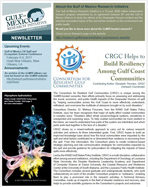 The Gulf of Mexico Research Initiative (GoMRI) features the Consortium for Resilient Gulf Communities (CRGC) as it’s cover story in its Summer 2016 Newsletter. Learn more »
The Gulf of Mexico Research Initiative (GoMRI) features the Consortium for Resilient Gulf Communities (CRGC) as it’s cover story in its Summer 2016 Newsletter. Learn more »
Assessing Deepwater Horizon Oil Spill Impacts on Families and Children
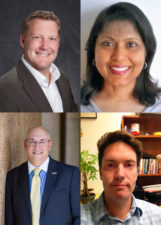 GoMRI recently awarded Tim Slack, a member of CRGC’s LSU team, a grant to continue impact assessments of the Deepwater Horizon oil spill on families and their children. This research is a follow on from the National Center for Disaster Preparedness’ 2010 survey of households in highly-affected Louisiana areas to track the health and social impacts of the spill as well as the subsequent studies in 2014, which revealed that physical and mental distress resulting from the spill still persisted, with over 15% of respondents reporting no perceived recovery of their household or community.
GoMRI recently awarded Tim Slack, a member of CRGC’s LSU team, a grant to continue impact assessments of the Deepwater Horizon oil spill on families and their children. This research is a follow on from the National Center for Disaster Preparedness’ 2010 survey of households in highly-affected Louisiana areas to track the health and social impacts of the spill as well as the subsequent studies in 2014, which revealed that physical and mental distress resulting from the spill still persisted, with over 15% of respondents reporting no perceived recovery of their household or community.
CRGC Holds All-Hands Meeting In Alabama, Tours Local Businesses in Bayou La Batre
 With team members spread across not only the Gulf States region, but also the entire U.S., CRGC recently held an “all-hands” meeting in Alabama to bring together its research staff, students, advisors, and community partners. The group also had the opportunity to tour local businesses in Bayou La Batre, AL.
With team members spread across not only the Gulf States region, but also the entire U.S., CRGC recently held an “all-hands” meeting in Alabama to bring together its research staff, students, advisors, and community partners. The group also had the opportunity to tour local businesses in Bayou La Batre, AL.
CRGC Appoints Alabama Stakeholder Advisory Committee
 A new stakeholder advisory committee will provide CRGC researchers with diverse perspectives on the environmental, public health, social, economic, legal, and cultural landscapes of Bayou La Batre, AL, and will provide feedback and make recommendations about the existing and planned activities of the CRGC.
A new stakeholder advisory committee will provide CRGC researchers with diverse perspectives on the environmental, public health, social, economic, legal, and cultural landscapes of Bayou La Batre, AL, and will provide feedback and make recommendations about the existing and planned activities of the CRGC.



